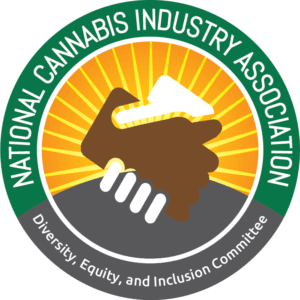by NCIA’s Diversity, Equity, and Inclusion Committee
 We are NCIA’s Diversity, Equity, and Inclusion Committee (DEIC), comprising experienced professionals representing a diverse range of backgrounds. In response to the early results of the Illinois Adult Use Dispensary application process, and with the interest of supporting Illinois’ Social Equity efforts, we felt compelled to reach out and offer our analysis and recommendations.
We are NCIA’s Diversity, Equity, and Inclusion Committee (DEIC), comprising experienced professionals representing a diverse range of backgrounds. In response to the early results of the Illinois Adult Use Dispensary application process, and with the interest of supporting Illinois’ Social Equity efforts, we felt compelled to reach out and offer our analysis and recommendations.
While the creation of the Social Equity Program in the Cannabis Regulation and Tax Act and Illinois Department of Financial and Professional Regulations (“IDFPR”) implementation of the licensing scheme was well-meaning and intentioned, the recent litany of lawsuits and outcry from advocacy groups following Illinois’ inaugural issuance of cannabis licenses indicates heavy criticism. As demonstrated thus far, the Social Equity Program appears limited in its ability to capture a sufficient representation of persons most harmed by the War on Drugs in Illinois in business licensure and ownership, or to generate the opportunities for restorative justice and building generational wealth for such persons as hoped.
Our intention with this letter is to state our express desire to lend the expertise and resources of NCIA’s DEIC to support Illinois legislators in crafting Illinois’ licensing and regulatory systems in a manner that reflects the Social Equity Program’s laudable mission of reducing barriers to cannabis business ownership, and establishing a legal cannabis industry that is equitable and accessible to those most harmed by the disparate enforcement of drug-related laws in Illinois. Furthermore, we hope to lend support to local organizations building toward that same goal, and to form a coalition as we all strive to rectify the harmful effects of prohibition and the War on Drugs.
At this time, and pending further collaboration with local officials, NCIA’s DEIC makes the following recommendations for your consideration. For further understanding of the analysis supporting these recommendations, please see the attached report.
For IDFPR to move forward with license scoring and issuance as soon as possible, we suggest the following:
- Removing the required possession of premises and overhead to hold on to property (not required of dispensary applications and may bankrupt existing applicants awaiting results)
- Ensuring oversight of KPMG (the 3rd-party firm hired by the State of Illinois to score the applications) by persons of color and social equity representatives
- Allowing for a documented appeals process internally with KPMG results before issuing them to all applicants
- Scrutinizing Operating Agreements in the rubric and gradient to ascertain and avoid predatory or straw-man agreements
Moving forward, reasonable transparency would include knowing what the makeup and process was for KPMG in making their first evaluations, and what the process will look like for the re-scoring to avoid conflicts of interest. Specifically, IDFPR can ensure transparency by making the following information public:
- Evaluation Rubric
- Composition of the Reviewers
- Scoring Process and Determination of Grading
- Frequency of KPMG Meetings
- KPMG Public Relations Contact
- Timeline of Events During the Scoring Process
- Lessons Learned and Plan for Improvement on Future Scoring Rounds
For future rounds of applications, we offer these recommendations:
- Pre-qualifying social equity applicants for state funding to ensure economic empowerment in the application process
- Providing a path forward for those who are not (yet) qualified to operate a cannabis business, but are qualified as social equity applicants
- Allowing for 100% Social Equity Applicant owned businesses to qualify for cannabis experience points without partnering with a multi-state operator (“MSO”)
- Issuing delivery licenses for social equity operators
We also express our support for the recommendations made by the Cannabis Business Association of Illinois’ Minority Access Committee, in their October 5, 2020, letter to Governor Pritzker. (see here)
Finally, we appreciate the efforts taken by Governor Pritzker, the Illinois legislature, and IDFPR thus far to address disparities in the application process and commend Governor Pritzker for taking leadership on this important issue. Allowing this first generation of applicants to address deficiencies in their applications, as it was originally intended to allow them to do, offers another opportunity to enter the lottery system, which we recognize and appreciate.
Additionally, the commission of a disparity study is commendable and should prove helpful in understanding what went wrong and how to improve. If anything, we hope our expertise and professional experience will assist in this process and in the effort to improve upon the mistakes of the past to achieve a more diverse, inclusive, and socially equitable future.
Thank you for your time and attention to this matter. Please let us know if we can assist in any way.
Sincerely,
The National Cannabis Industry Association
Diversity, Equity, and Inclusion Committee
The full letter and analysis can be found here.


Follow NCIA
Newsletter
Facebook
Twitter
LinkedIn
Instagram
–